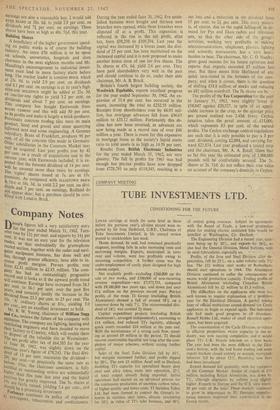Company Notes
necca's figures tell a very satisfactory story for the year ended March 31, 1962. Turn- over rose by 121 per cent. and exports by 142 per cent It was not an easy year for the television trades, so that undoubtedly the gramophone record section, together with the radar and navi- gator equipment business, has done well and has, through greater efficiency, been able to in- crease profit margins. Pre-tax profits rose from £2.31 million to £2.93 million. The com- PanY has had an outstandingly progressive record and it looks as if the upward profit trend Will continue. Earnings have increased from 34.3 Per cent to 56.1 per cent. over the past five Years, and certainly justify the increase in the dividend from 23.3 per cent. to 25 per cent. The los- `A' ordinary shares at 81s., yielding 3.0 Per cent., are an excellent investment to hold. Mr. R. W. Young, chairman of William Sugg and
Co., reviews the future of his company with uptim. ism. The company are lighting, heating and ventilating engineers and have decided to move their factory to Crawley, which will enable them To dispose of the valuable site at Westminster.
1.1e net profit after tax of £64,583 for the year to tune 30, 196', was slightly down on the dprevious year's figure of £78,243. The final divi- 20" of 13 per cent. maintains the dividend- . Per Cent'--at practically the same rate as before. This, the chairman considers, is fully iu.stified as outstanding orders are substantially higher than this time last year and the liquid possition has greatly improved. The 5s. shares at sY. u ld are fairly valued, yielding 5.4 per cent., and
be a promising investment.
as
Furbuoys continues its policy of expansion newsagents, tobacconists and confectioners. During the year ended June 30, 1962, five estab- lished business were bought and thirteen new branches were opened, while three branches were disposed of at a profit. This expansion is reflected in the rise in the net profit, after tax, from £98,298 to £109,394. Last year the capital was increased by a bonus issue; the divi- dend of 25 per cent. has been maintained on the increased capital and it is now proposed to make another bonus issue of one for five shares. The 5s. shares at 47s. 6d. yield 2.6 per cent. They have paid shareholders very well in the past and should continue to do so, under their able chairman, Mr. A. B. Brock.
Britain's fourth largest building society, the Woolwich Equitable, reports excellent progress for the year ended September 30, 1962. An ex- pansion of 11.4 per cent. has occurred in the assets, increasing the total to £232.55 million. Receipts from shareholders rose by £6.93 mil- lion, but mortgage advances fell from £36.65 million to £33.12 million. Fortunately this de- cline has now been reversed, as advances are now being made at a record rate of over £40 million a year. There is room for this expansion in mortgage loans as the society's liquid assets ratio to total assets is as high as 14.59 per cent.
Results from British Electronic Industries for the year ended March 31, 1962, are very gloomy. The fall in profits for 1961 was bad enough but pre-tax profits have now dropped from £728,781 to only £118,343, resulting in a net loss and a reduction in the dividend from 15 per cent. to 2+ per cent. This sorry picture is, of course, due to the rapid falling-off in de- mand for Pye and Ekco radios and television sets, so that the other side of the group's activities, working very profitably in making telecommunications, telephones, plastics, lighting and scientific instruments, has a very heavy burden to bear. The chairman, Mr. C. 0. Stanley, gives good reasons for his future optimism and reports that exports exceeded £7 million last year. But there seems little likelihood of any quick turn-round in the fortunes of the com- pany; and when it comes, there is the question of shifting £18.8 million of stocks and reducing an £81 million overdraft. The 5s. shares are 9s.
The profits of the Tea Corporation• for the yeai to January 31, 1962, were slightly: lower at' £18,047 against £20,527, in spite 'of an appre ciable increase in the crop, as the average price per pound realised was 2.45d. lower; Ceylon taxation takes the penal amount. of £15,000, which represents 83 per cent. of '.the earned profits. The Ceylon exchange controt-regulations. are such that it is only possible to pay 'a 3 per cent. dividend, costing £2,894, and carrying for- ward £21,874. Last year produced 'a record crop and the chairman, Mr. A. A. Estall,.-Sfates that so far this year. the estimated crojcof 1,800,000 pounds will be comfortably secured. The 5s. shares at 2s. lid. do not reflect their_true value on account of the company's domicile in Ceylon.










































































 Previous page
Previous page